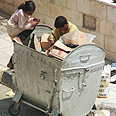
'Food insecurity' rampant in West Bank, Gaza
The Independent quotes UN report as saying that some action taken by Palestinian families to continue to feed themselves amid economic siege on Hamas-led government- including sale of land, jewelry and other assets - will have an ‘irreversible impact on livelihoods’
According to The Independent, the unpublished draft report on the impact of the global boycott of the Hamas-led Palestinian Authority says the problem "is primarily a function of restricted economic access to food resulting from ongoing political conditions."
The Independent said the report “paints a bleak picture of the impact on food consumption and expenditure throughout the occupied Palestinian territories.” The situation is "more grim" in Gaza where four out of five families have reduced their spending - including on food - in the first quarter of last year alone, the report said.
The report, according to the British newspaper’s online edition, acknowledges that "traditionally strong ties" among Palestinian families tend to reduce the possibility of "acute household hunger".
However, the report warns that against a background of decreasing food security since the beginning of the Intifada since 2000 and the loss of PA salaries because of the boycott there are now "growing concerns about the sustainability of Palestinians' resilience," The Independent said.
'Slow but steady growth in actual malnutrition'
The UN report says 34 percent of households - with income below $1.68 per day and/or showing decreasing food expenditures - are "food insecure," said The Independent. The UN’s World Food Program officially defines "food security" as "the ability of a household to produce and/or access at all times the minimum food needed for a healthy and active life."
According to The Independent, the report points out that some action taken by families to continue to feed themselves - including the “sale of land, jewelry and other assets" - will have an "irreversible impact on livelihoods."
It also points out that limitations to PA budget support, the private sector and job programs because of the boycott are likely to exacerbate Palestinians' dependency on humanitarian assistance and postpone sustainable improvement," the article said.
The report details dietary changes by many to ensure enough to eat, including reductions in consumption of fruits, sweets, olive oil, and - normally a staple in Gaza – fish, adding that for other families - including "new poor" suffering from loss of PA incomes - there has been a "decrease in the quality of and/or quantity of food consumed."
The UN report comes against a background in which a 2004 survey of Palestinian households showed a "slow but steady" growth in actual malnutrition - as measured by reduced growth, vitamin deficiencies, anemia and other indicators - among a minority of the population, The Independent said.















